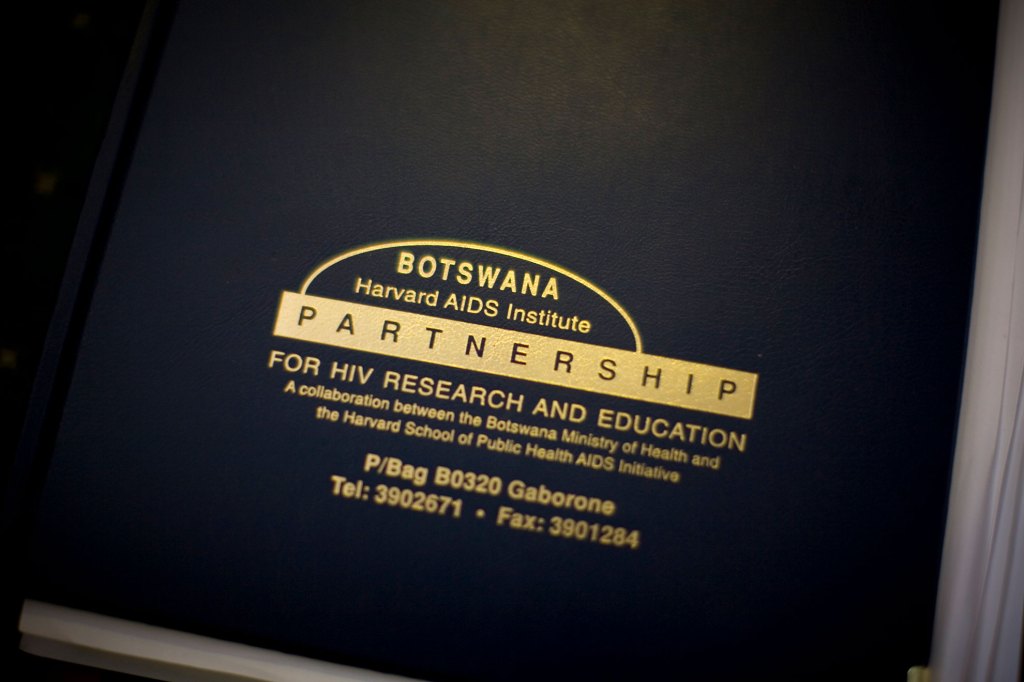For more than 20 years, Harvard infectious disease specialist Roger Shapiro has fought HIV on the ground in Botswana, where the rate of infection exceeded 30 percent in some areas of the country in the 1990s.
Progress has been steady. According to the World Bank, Botswana still has one of the world’s highest rates of infection — over 20 percent of the adult population — but far fewer HIV deaths. The main lifesaver has been antiretroviral treatment (ART).
Shapiro began working in Botswana in 1999 under the mentorship of pioneering AIDS researcher Max Essex, who helped launch the Botswana Harvard Health Partnership (BHP) as a collaboration between the country’s Ministry of Health and what was then called the Harvard School of Public Health. Since then, Shapiro has run dozens of studies on HIV/AIDS in Botswana and has become an expert in how HIV affects maternal and child health.
In 2008, pioneering AIDS researcher Professor Max Essex spoke to a group gathered at his lab in Gaborone, Botswana.
Harvard file photos

Among Shapiro’s current studies is a trial with the potential to help some children control HIV without the need for treatment. Efforts to create a vaccine have failed, but there are exciting new developments with products known as broadly neutralizing antibodies, or bNAbs, Shapiro says.
His trial aims to find a new treatment option by examining the effects of a combination of three broadly neutralizing HIV antibodies. The research builds upon previous studies suggesting that bNAbs might help the immune system clear the virus better than standard ART, and may offer a promising avenue for getting to post-treatment viral control, he says.
“It is the only study in pediatrics looking at three antibodies as combination treatment for HIV and ultimately as a path toward HIV cure,” said Shapiro, a professor of immunology and infectious diseases at the Chan School. “It’s really exciting science, since we are testing whether some children can go off all treatment and control HIV on their own.”
“Botswana probably has the best program to prevent HIV transmission to children on the continent.”
Roger Shapiro
In May, the five-year grant supporting the study was slashed as part of the Trump administration’s mass cancellation of Harvard research funds. Four other grants for Botswana-based projects led by Shapiro were also canceled. The cuts have not only dealt a serious blow to the participants in the trial and their families, said Shapiro, but imperiled progress toward a cure for pediatric HIV.
“This was one of the largest funded studies to begin making inroads in this field,” he said. “Now all this science is up in the air. It has the potential to set back the pediatric cure agenda for years, if not longer.”
Funded by National Institutes of Health and the National Institute of Allergy and Infectious Diseases, the trial is following 12 children, ages 2-9 years, who are living with HIV. The study is in its second year, and researchers have been gearing up to have the children pause standard ART and start using antibodies alone as treatment.
The team had planned to scale up to 41 children, but due to the cuts, they are now aiming for 30. They were able to secure donations to continue with the project until March, but it’s unclear what will happen after that.
According to the Centers for Disease Control, Botswana is a leader in global HIV efforts, having exceeded the UNAIDS 95-95-95 targets: “95 percent of people living with HIV in Botswana know their status, 98 percent of people who know their status receive treatment, and 98 percent of people on treatment are virally suppressed.”
“Botswana probably has the best program to prevent HIV transmission to children on the continent,” said Shapiro. “Now less than half a percent of the children become infected because most women access free drug treatment during pregnancy, which effectively turns off transmission. It’s a tiny percentage, but it still leads to more pediatric HIV infections than we see in the United States.”
Giving treatment to children infected with HIV every day for the rest of their lives is a daunting prospect for many families, said Shapiro. Families were excited about the possibility of their children being liberated from regular infusions of antibodies.
The grant’s termination has added more uncertainty to Botswana’s fight against HIV/AIDS. In February, assistance through USAID, the U.S. President’s Emergency Plan for AIDS Relief (PEPFAR), and the Centers for Disease Control and Prevention to the African country was also cut. Botswana’s government pays for medication, but it relied on those funds to provide services around HIV, said Shapiro.
“HIV/AIDS is essentially a chronic problem in Botswana, and a chronic problem needs ongoing treatment,” he said. “If treatment lapses … We worry about HIV transmission going back up again, not only in Botswana but throughout all of Africa.”
